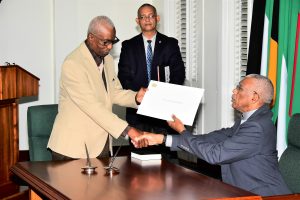Canada remains ‘neutral’ in unilateral appointment of GECOM Chairman
Newly appointed Canadian High Commissioner to Guyana, Lilian Chatterjee, says that Canada wishes to remain “neutral” as it relates to the unilateral appointment of Justice James Patterson as Chairman of the Guyana Elections Commission (GECOM).
In a brief comment to the News Room on Friday, October 27, 2017, Chatterjee made it clear that Canada does not want to be seen as “taking sides.”
“As a friend of Guyana and as a member of the Organisation of American States (OAS), democratic norms and the rule of law must be respected and all I want to say here is that my statement stands for itself; it shouldn’t be misconstrued. I do not want to be perceived as taking any sides…we are remaining strictly neutral,” the Canadian High Commissioner said.

On October 19, President David Granger unilaterally appointed 84-year-old Patterson as the GECOM Chair, after rejecting 18 persons who were nominated by Opposition Leader, Bharrat Jagdeo. The President had said that the nominees were not “fit and proper” to serve as the GECOM Chair.
This is the first time in the country’s history that the GECOM Chairman was appointed outside of the process established by the Carter Formula which was incorporated into the Constitution to ensure there are equity and impartiality installed in the process that governs national elections.
Justice Patterson is currently on a team of legal advisers which assists Legal Affairs Minister and Attorney General, Basil Williams. He also served as Chairman of the Commission of Inquiry (COI) into the March 2016 Camp Street Prison unrest.
Granger’s decision has received widespread condemnation from civil society, the Private Sector Commission, the Guyana Human Rights Association, the Guyana Bar Association, the Guyana Association of Women Lawyers among others.
They are all calling on the President to provide reasons why each nominee was rejected, in keeping with a ruling by Chief Justice (ag), Justice Roxanne George-Wiltshire, who had ruled that the President must, in the furtherance of good governance and democracy, give reasons for rejecting each nominee as not “fit and proper.” However, Granger has flatly refused to do so.
“I do not know that that requirement is enshrined in the Constitution… I have not seen in the Constitution which requires me, I know the Chief Justice has made certain statements and I intend not to contradict the Chief Justice but I have not been advised that that is a requirement which is enforceable,” he told reporters on the sidelines of an event at State House on Monday, October 23.






